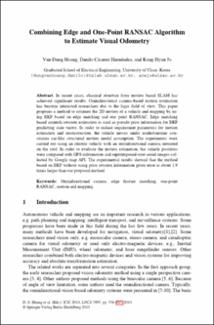El sistema se apagará debido a tareas habituales de mantenimiento. Por favor, guarde su trabajo y desconéctese.
Combining Edge and One-Point RANSAC Algorithm to Estimate Visual Odometry
| dc.contributor.author | Cáceres Hernández, Danilo | |
| dc.contributor.author | Dung Hoang, Van | |
| dc.contributor.author | Hyun Jo, Kang | |
| dc.date.accessioned | 2018-06-27T21:04:26Z | |
| dc.date.accessioned | 2018-06-27T21:04:26Z | |
| dc.date.available | 2018-06-27T21:04:26Z | |
| dc.date.available | 2018-06-27T21:04:26Z | |
| dc.date.issued | 2013-07-28 | |
| dc.date.issued | 2013-07-28 | |
| dc.identifier.uri | http://ridda2.utp.ac.pa/handle/123456789/5082 | |
| dc.identifier.uri | http://ridda2.utp.ac.pa/handle/123456789/5082 | |
| dc.description | In recent years, classical structure from motion based SLAM has achieved significant results. Omnidirectional camera-based motion estimation has become interested researchers due to the lager field of view. This paper proposes a method to estimate the 2D motion of a vehicle and mapping by using EKF based on edge matching and one point RANSAC. Edge matching based azimuth rotation estimation is used as pseudo prior information for EKF predicting state vector. In order to reduce requirement parameters for motion estimation and reconstruction, the vehicle moves under nonholonomic constraints car-like structured motion model assumption. The experiments were carried out using an electric vehicle with an omnidirectional camera mounted on the roof. In order to evaluate the motion estimation, the vehicle positions were compared with GPS information and superimposed onto aerial images collected by Google map API. The experimental results showed that the method based on EKF without using prior rotation information given error is about 1.9 times larger than our proposed method. | en_US |
| dc.description.abstract | In recent years, classical structure from motion based SLAM has achieved significant results. Omnidirectional camera-based motion estimation has become interested researchers due to the lager field of view. This paper proposes a method to estimate the 2D motion of a vehicle and mapping by using EKF based on edge matching and one point RANSAC. Edge matching based azimuth rotation estimation is used as pseudo prior information for EKF predicting state vector. In order to reduce requirement parameters for motion estimation and reconstruction, the vehicle moves under nonholonomic constraints car-like structured motion model assumption. The experiments were carried out using an electric vehicle with an omnidirectional camera mounted on the roof. In order to evaluate the motion estimation, the vehicle positions were compared with GPS information and superimposed onto aerial images collected by Google map API. The experimental results showed that the method based on EKF without using prior rotation information given error is about 1.9 times larger than our proposed method. | en_US |
| dc.language | eng | |
| dc.language.iso | eng | en_US |
| dc.rights | https://creativecommons.org/licenses/by-nc-sa/4.0/ | |
| dc.rights | info:eu-repo/semantics/openAccess | |
| dc.subject | Omnidirectional camera | en_US |
| dc.subject | edge feature matching | en_US |
| dc.subject | one-point RANSAC | en_US |
| dc.subject | motion and mapping | en_US |
| dc.subject | Omnidirectional camera | |
| dc.subject | edge feature matching | |
| dc.subject | one-point RANSAC | |
| dc.subject | motion and mapping | |
| dc.title | Combining Edge and One-Point RANSAC Algorithm to Estimate Visual Odometry | en_US |
| dc.type | info:eu-repo/semantics/article | |
| dc.type | info:eu-repo/semantics/publishedVersion |
